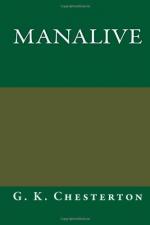Existence with such a man was an obstacle race made out of pleasant obstacles. Out of any homely and trivial object he could drag reels of exaggeration, like a conjurer. Nothing could be more shy and impersonal than poor Arthur’s photography. Yet the preposterous Smith was seen assisting him eagerly through sunny morning hours, and an indefensible sequence described as “Moral Photography” began to unroll about the boarding-house. It was only a version of the old photographer’s joke which produces the same figure twice on one plate, making a man play chess with himself, dine with himself, and so on. But these plates were more hysterical and ambitious—as, “Miss Hunt forgets Herself,” showing that lady answering her own too rapturous recognition with a most appalling stare of ignorance; or “Mr. Moon questions Himself,” in which Mr. Moon appeared as one driven to madness under his own legal cross-examination, which was conducted with a long forefinger and an air of ferocious waggery. One highly successful trilogy—representing Inglewood recognizing Inglewood, Inglewood prostrating himself before Inglewood, and Inglewood severely beating Inglewood with an umbrella— Innocent Smith wanted to have enlarged and put up in the hall, like a sort of fresco, with the inscription,—
“Self-reverence, self-knowledge,
self-control—
These three alone will make a man a prig.”
—Tennyson.
Nothing, again, could be more prosaic and impenetrable than the domestic energies of Miss Diana Duke. But Innocent had somehow blundered on the discovery that her thrifty dressmaking went with a considerable feminine care for dress—the one feminine thing that had never failed her solitary self-respect. In consequence Smith pestered her with a theory (which he really seemed to take seriously) that ladies might combine economy with magnificence if they would draw light chalk patterns on a plain dress and then dust them off again. He set up “Smith’s Lightning Dressmaking Company,” with two screens, a cardboard placard, and box of bright soft crayons; and Miss Diana actually threw him an abandoned black overall or working dress on which to exercise the talents of a modiste. He promptly produced for her a garment aflame with red and gold sunflowers;




